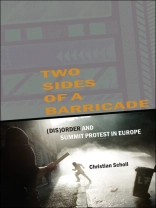Two Sides of a Barricade argues that to construct global democracy, conflict and dissent must be taken seriously. Christian Scholl explores the political significance of the confrontations within four sites of interaction: bodies, space, communication, and law. Each site of struggle provides a different entry point to understand the influence of protester and police tactics on each other. At the same time, the four sites of struggle allow a comprehensive analysis of how the contestation of global hegemonic forces during summit protests trigger a preemptive shift in social control through increased deployment of biopolitical forms of power.
This book is freely available in an open access edition thanks to Knowledge Unlatched—an initiative that provides libraries and institutions with a centralized platform to support OA collections and from leading publishing houses and OA initiatives. Learn more at the Knowledge Unlatched website at:
https://www.knowledgeunlatched.org/, and access the book online at the SUNY Open Access Repository at
http://hdl.handle.net/20.500.12648/1709.
Cuprins
Figures
Abbreviations
Acknowledgments
1. Barricades are back
2. Global dissent: tactical trajectories
3. Understanding interaction tactically
4. Bodies that matter: the epistemology
5. ‘Leave them no space!’ The microphysics of spatial interactions
6. Psy(c)ops, spin-doctors and the communication of dissent
7. ‘A revolt is a revolt is a revolt.’ Violence, law, and the exception
8. Back to the barricades
Endnotes
Appendix
Bibliography
Despre autor
Christian Scholl is Lecturer in Political Science at the University of Amsterdam in the Netherlands. He is the coauthor (with Amory Starr and Luis Fernandez) of
Shutting Down the Streets: Political Violence and Social Control in the Global Era.












